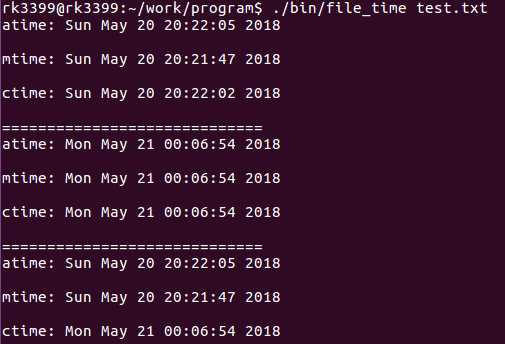标签:信息 [] 自动更新 mem turn stderr === bubuko ons
存在于 stat 结构体中

utime(修改文件的存取时间和更改时间)
相关函数 utimes,stat
1 #include <sys/types.h> 2 #include <utime.h> 3 int utime(const char * filename, struct utimbuf * buf);
1 结构体 utimbuf 定义如下 2 struct utimbuf{ 3 time_t actime; //访问时间 4 time_t modtime; //修改时间 5 };
file_time.c
1 #include <time.h> 2 #include <sys/types.h> 3 #include <utime.h> 4 #include <stdio.h> 5 #include <stdlib.h> 6 #include <errno.h> 7 #include <sys/stat.h> 8 #include <fcntl.h> 9 #include <string.h> 10 #include <unistd.h> 11 #include <memory.h> 12 13 // ctime 函数 将事件转换成字符串输出 14 void out(struct stat buff) 15 { 16 time_t val_atime = (time_t)buff.st_atime; 17 time_t val_mtime = (time_t)buff.st_mtime; 18 time_t val_ctime = (time_t)buff.st_ctime; 19 printf("atime: %s\n", ctime(&val_atime)); 20 printf("mtime: %s\n", ctime(&val_mtime)); 21 printf("ctime: %s\n", ctime(&val_ctime)); 22 } 23 24 //获取文件属性信息 25 struct stat get_stat(char *file, struct stat buff) 26 { 27 memset(&buff, 0, sizeof(buff)); 28 if(lstat(file, &buff) < 0) { 29 perror("lstat error"); 30 exit(1); 31 } 32 33 return buff; 34 } 35 36 int main(int argc, char *argv[]) 37 { 38 if(argc < 2) { 39 fprintf(stderr, "usage:%s file\n", argv[0]); 40 exit(1); 41 } 42 43 struct stat buff; 44 buff = get_stat(argv[1], buff); 45 46 //备份原先的时间 47 struct stat bak_stat = buff; 48 out(buff); 49 printf("=============================\n"); 50 51 //设置文件的事件为当前系统时间 52 utime(argv[1], NULL); 53 buff = get_stat(argv[1], buff); 54 out(buff); 55 printf("=============================\n"); 56 57 //把文件的时间恢复成之前的时间 58 struct utimbuf timebuf; 59 timebuf.actime = bak_stat.st_atime; 60 timebuf.modtime = bak_stat.st_mtime; 61 utime(argv[1], &timebuf); 62 buff = get_stat(argv[1], buff); 63 out(buff); 64 65 return 0; 66 }
编译执行:

ctime 的时间是 i 节点的最后更改时间,只要调用了 utime 就会自动修改 ctime。
标签:信息 [] 自动更新 mem turn stderr === bubuko ons
原文地址:https://www.cnblogs.com/kele-dad/p/9065306.html